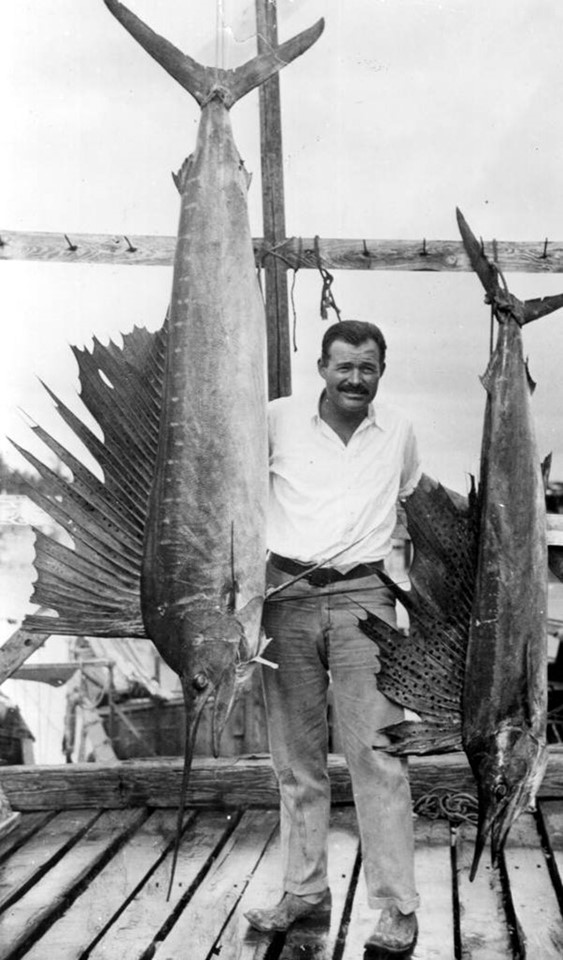| Reader,  Fish today are vastly different from when Earnest Hemingway wrestled giant sailfish off the coast of Key West. | You know all the health benefits of eating fish.
That it reduces your risk of heart disease... boosts your brainpower... protects your bones... and keeps your skin youthful.
Most doctors, nutritionists, and the media will advise you to eat more fish — but you're not getting the full story.
These days, you must be extremely choosy about the fish you eat.
That's because the vast majority of fish you buy in supermarkets, restaurants, and even from specialty fishmongers are downright dangerous.
Recent studies reveal that many fish contain hidden toxic ingredients that can... - Disrupt your hormonal systems
- Increase your risk of illnesses, including diabetes and cancer
- Increase your stress levels
- Make you fat
Our ancestors thrived on eating fish fresh from rivers and oceans. Today, wild fish swim in waters that are infested with toxic plastic trash and dangerous industrial pollutants.
Many people think eating farmed fish is a better option because it's more sustainable and plastic-free.
Neither of these claims is true.
Fish farming – or pisciculture – closely resembles the factory farming of terrestrial livestock like cattle, pigs, and chickens. Both forms of industrial farming practices prioritize yield over the welfare of the animal and the end consumer. And both produce unhealthy foods that are unfit for human consumption.
These days, in most cases, a healthy-looking salmon steak is more likely to contribute to a weight problem than help you shed unwanted belly fat. That's because today the vast majority of salmon – along with many other types of fish – are farm-raised.
And that means they're packed with poisons.
Multiple research studies have found that pretty much all farmed fish contain high levels of toxic chemicals, many of which have been banned or restricted in America and Europe.
These include polychlorinated biphenyls (PCBs), dioxins, flame retardants, and pesticides.
All of these chemical pollutants have terrible effects on your body and have been linked to weight gain as well as a range of diseases, including obesity.
In a study by the Environmental Working Group, researchers found that multiple samples of farmed salmon – the most common farmed fish – were contaminated with PCBs, as well as more than 100 pollutants and pesticides.1
In a population-based cohort study, researchers in Sweden found that high levels of the toxins most often found in farmed seafood were linked with excess abdominal fat and obesity in thousands of individuals.2
Other studies reveal that frequent consumption of farmed salmon can cause insulin resistance, diabetes, and obesity.3
You see, farm-raised fish have much higher levels of contamination because the fish are fed concentrated toxic fish meal to fatten them up. Also mixed into that fish meal is genetically modified corn, soy, and canola oil. Some even get pellets of chicken, pig, and duck feces.
Then there's the plastic fish eat… It's now estimated that up to 51 trillion pieces of plastic contaminate our oceans.
You may already know that some of the chemicals in these plastics – like bisphenol A and phthalates – disrupt hormones. They lead to estrogen overload in men and women alike. They lower a man's testosterone. They disrupt thyroid function to make you gain weight.
They also bring on extreme symptoms of PMS and menopause. They can also lead to diabetes, neurological problems, heart disease, and infertility.4 And they've been linked to breast and other hormone-related cancers. 7 Fish To Avoid And 7 You Can Eat All Day Long I strongly recommend you stay away from all kinds of farmed fish. But not all wild-caught fish are safe either. Here are the seven worst fish you need to stay away from: - Farmed or Atlantic Salmon. Most salmon marketed as "Atlantic" salmon are farmed. They are full of pesticides, feces, bacteria, and parasites. Wild-caught Atlantic salmon is illegal because they are an endangered species.
- Imported Catfish. This trendy menu item is really named pangasius. Studies show up to 80% of these fish are contaminated with vibrio bacteria – the same microbes that cause shellfish poisoning. They are raised in fish factories where fish swim in waste and sludge, and are treated with high doses of antibiotics, pesticides, and disinfectants.
- Chilean Sea Bass. Also known as Patagonia toothfish, this fish has high mercury levels.
- Grouper. This fish is also very high in mercury.
- Atlantic Bluefin Tuna. Often found on sushi menus as Hon Maguro, this is also a fish high in mercury. Instead of eating this, look for katsuo or wild-caught skipjack tuna.
- Swordfish. Mercury in this fish is so high women and children should avoid it altogether. Men should limit it to one serving a month at the most.
- King Mackerel. Some types of mackerel are safe. But avoid King and Spanish mackerel. They harbor high levels of mercury.
My advice is to stick to fish that are lower down on the food chain because they have a lower concentration of contaminants.
My favorite seven are wild-caught Alaskan salmon, Pacific sardines, Atlantic mackerel, sablefish/black cod, albacore tuna (troll- or pole-caught), wild-caught west coast Dungeness crab, and squid.
To Your Good Health, 
Al Sears, MD, CNS
References: - EWG Research Report. "PCBs in farmed salmon: Test results show high levels of contamination." Accessed on October 12, 2024.
- Lee DH, et al. "Associations of persistent organic pollutants with abdominal obesity in the elderly: The Prospective Investigation of the Vasculature in Uppsala Seniors (PIVUS) study." Environ Int. 2012 Apr;40:170-8.
- Ibrahim MM, et al. "Chronic consumption of farmed salmon containing persistent organic pollutants causes insulin resistance and obesity in mice." PLoS ONE 6(9): e25170. 2011.
- Ziv-Gai, A., et al. "The effects of in-utero bisphenol-A exposure reproductive capacity in several generations of mice." Toxicology and Applied Pharmacology. 2015. DOI: 10.1016/j.taap.2015.03.003.
|
No comments:
Post a Comment